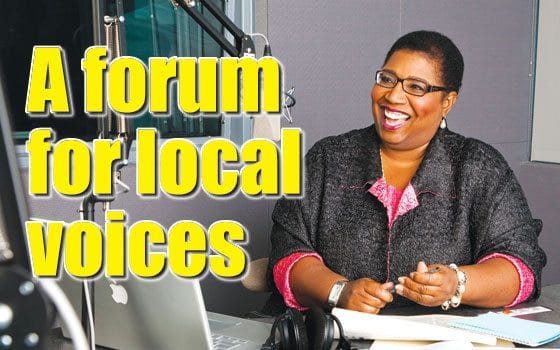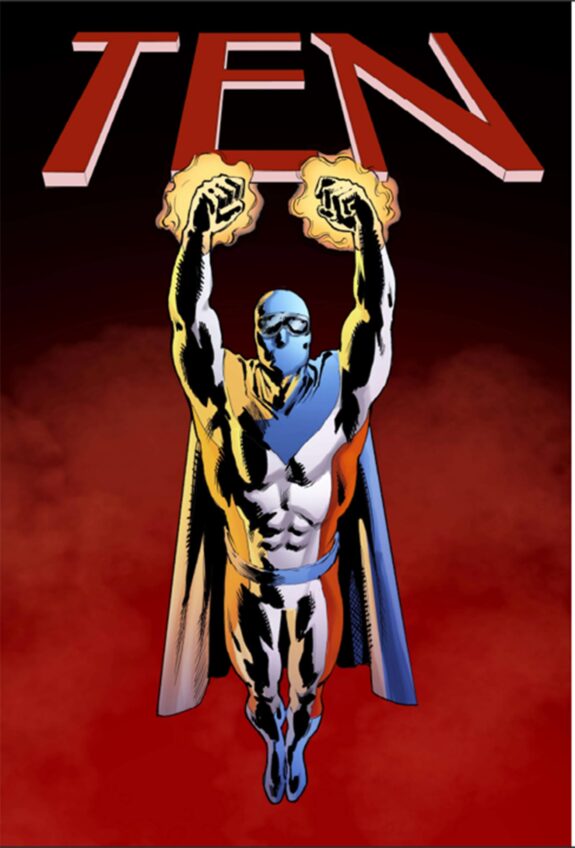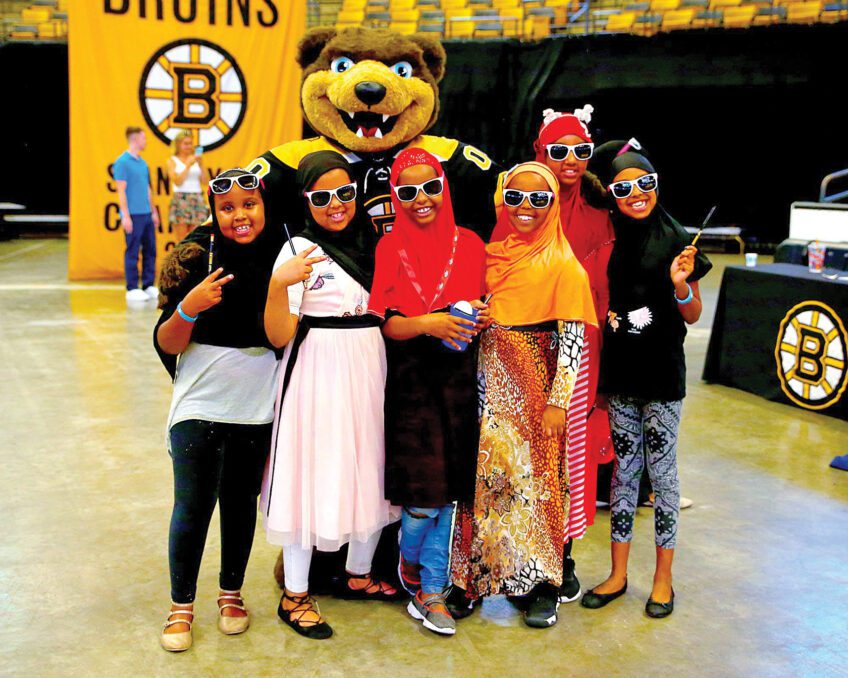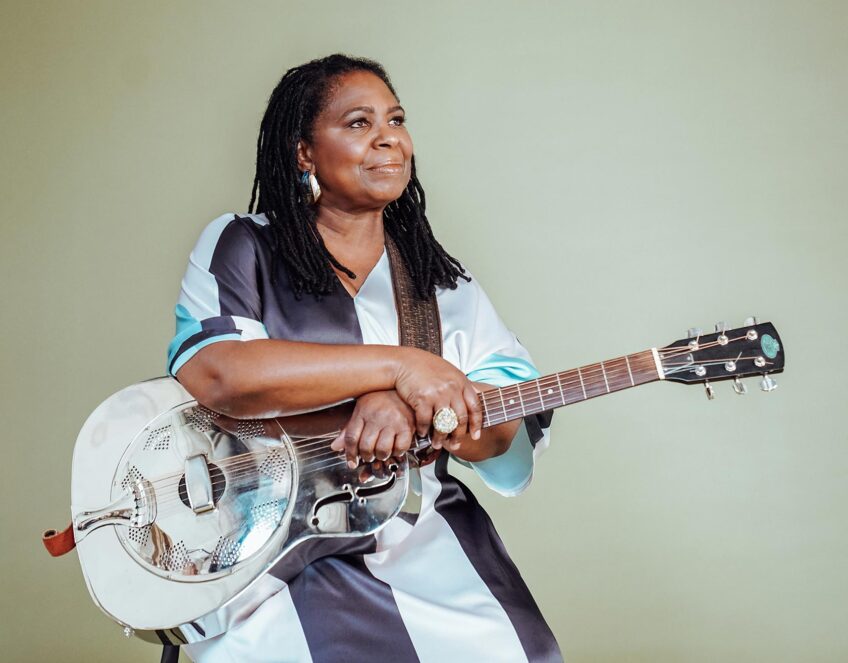
Award-winning journalist Callie Crossley is serious about airing different perspectives on her WGBH radio show
“The Callie Crossley Show” has been airing on WGBH-Radio since the station made the switch a year ago from classical music to news and information. The public radio station tapped Callie Crossley, a seasoned, award-winning journalist and commentator, to host the hour-long show starting at 1 p.m., Monday through Friday.
A Wellesley College graduate, Crossley is a regular panelist on “Beat the Press” on WGBH-TV, a frequent commentator for the Fox 25 TV’s Morning Show and the program manager for the Nieman Foundation for Journalism at Harvard University. She has won a national Emmy for her work on the “Eyes on the Prize” documentary on the civil rights movement, and nearly all of the top broadcast journalism awards.
In an interview to mark the first anniversary of her debut as a radio host, Crossley talked with the Bay State Banner about her show’s focus on explaining local and regional news, bringing new voices on air and covering a mix of little-known stories, some on the lighter side.
How much radio work had you done before getting the opportunity to host your own show?
I’ve done a fair amount of ‘guesting’ on a variety of radio shows. Hosting is an entirely different experience. As a host, I have to be concerned about not only what you’re saying, but also with what I’m saying, keeping track of time, making certain the conversation is flowing if there are several people involved, and making sure that you as a guest are well-served in getting out what you want to say. And what I want you to say — so people understand why I booked you in the first place. I substituted for Michel Martin [host of “Tell Me More” on National Public Radio] for a week two years ago. That’s as close as I had come to the real hosting role.
What are you are trying to do with your show and what makes it different from other radio talk shows in Boston?
We’re trying to embrace a variety of perspectives and bring in multiple voices. I know people say that all the time. But in truth, if you listen to different radio programs a lot, you’re likely to hear the same voices over and over again. Because we are in Boston, these are often very interesting people, very knowledgeable people, and folks with special expertise. The usual suspects are quite good, so it’s not wrong to book them.
But I also know those people represent the tiniest part of the population of folks in Boston and New England who are just as fabulous and interesting. I said during the very first discussion about doing the show that I wanted a lot of voices that have not been heard before, at least in this format. I want to make visible people who have a lot to offer but just didn’t have the platform or forum. I know that we are doing a good job because many other shows have tried to rip off my regular contributors.
One segment on Fridays is a week-in-review panel of journalists from ethnic, alternative and community newspapers, including the Banner. Why have you taken that approach?
It’s one of the regular segments we do to brand the show. We knew that there were already many week-in-review segments. So what could we do, hewing to our mission of different voices, different perspectives, and making certain we stayed on our mission as a local show? We decided, let’s do hyper-local. That’s what everybody is talking about as a media trend.
We are deliberately looking for stories that have not gotten any attention. Some of those have grown into big stories in the mainstream press later, and we’ve had the opportunity to talk about them first. Many people haven’t heard these stories. That makes the segment fresh and interesting. We get that feedback from a lot of people. ‘Hey, I didn’t know that.’ That’s exactly what I want.
With the recent ouster of Chuck Turner, we had a discussion in week-in-review with journalists from community and alternative presses. We focused on the peculiar position of Ayanna Pressley and Felix Arroyo, and they’re having to vote for Chuck Turner’s ouster but being very much appreciative of his leadership and legacy, and receiving hate mail from people who did not appreciate that they were in a very difficult position. I didn’t see that perspective until way later — in any detailed way.
We give 40 minutes to allow a relaxed, detailed conversation. We try to get both very serious things and also, because we like humor, funny things or interesting feature stories.
Which aspect of the show’s overall approach best reflects what you’ve succeeded in doing?
I call my show a ‘these days show’ as opposed to a ‘today show.’ A today show is a breaking news show. A ‘these days show’ may not deal with what happens today, in this moment, but may take two days or three days or a week to ask, what does this mean? And here’s the context, by the way. We really try to take a little step back.
For example, when the Mattapan shootings happened, there was wall-to-wall coverage everywhere. We recognized it to be an important, tragic event, but how would we add something interesting to the conversation? We decided that we’d take a three-part look. We had Rev. Bruce Wall talk about very concrete initiatives that he thinks should be happening and have been tried in other places, and what he sees happening in the city, or not happening, that allows this latest tragic event to happen. Then we moved to Omar Wasow, who had just completed a study — he’s at Harvard studying at the Graduate School of Education — looking at violence in this area, historically. What lessons, we asked, came from that?
Finally, we talked to a group of mostly retired police officers that has come out in favor of legalizing drugs. A piece of this whole incident had to do with drug trafficking. These officers are saying: If you legalize drugs — and it’s going to sound crazy coming from cops, but we know because we’re on the streets. We’re wasting too much time and money trying to deal with street crime. If the illegality was removed, you can really get down to some of the other issues. That was a provocative conversation, because that’s not what you expect from a cop, certainly not in the face of that kind of event. That’s what we’re looking to do every day. What else can I say that will make our listeners go, hmmm?
What do you know about who are your listeners?
What we know concretely, from what WGBH has said, 97,000 people are regular listeners to the news and talk format since the station made the switch last year. Nobody was expecting to have this much significant movement in a short period of time.
I was trying to go beyond what people call the NPR audience — 40, white, female or male. I’m fairly confident we have, from our Facebook page and Twitter. What makes me feel good, anecdotally, is a couple of my team members have been out and about, and overheard people say, ‘I heard about this on the Callie Crossley Show.’
Finally, how does your radio show flow from your other work?
It is all interconnected. I have gotten to know many resources from my work at Harvard because there are so many interesting but — perhaps not as well-known — people doing fascinating work. That’s been great.
With regards to every other job that I do, the show has brought together things I have been talking about and doing anyway. I have a wide range in interests. Some are quirky. My wide-ranging interests, having ‘guested’ and done so much work in a variety of media is really helpful. And I do like to talk.






